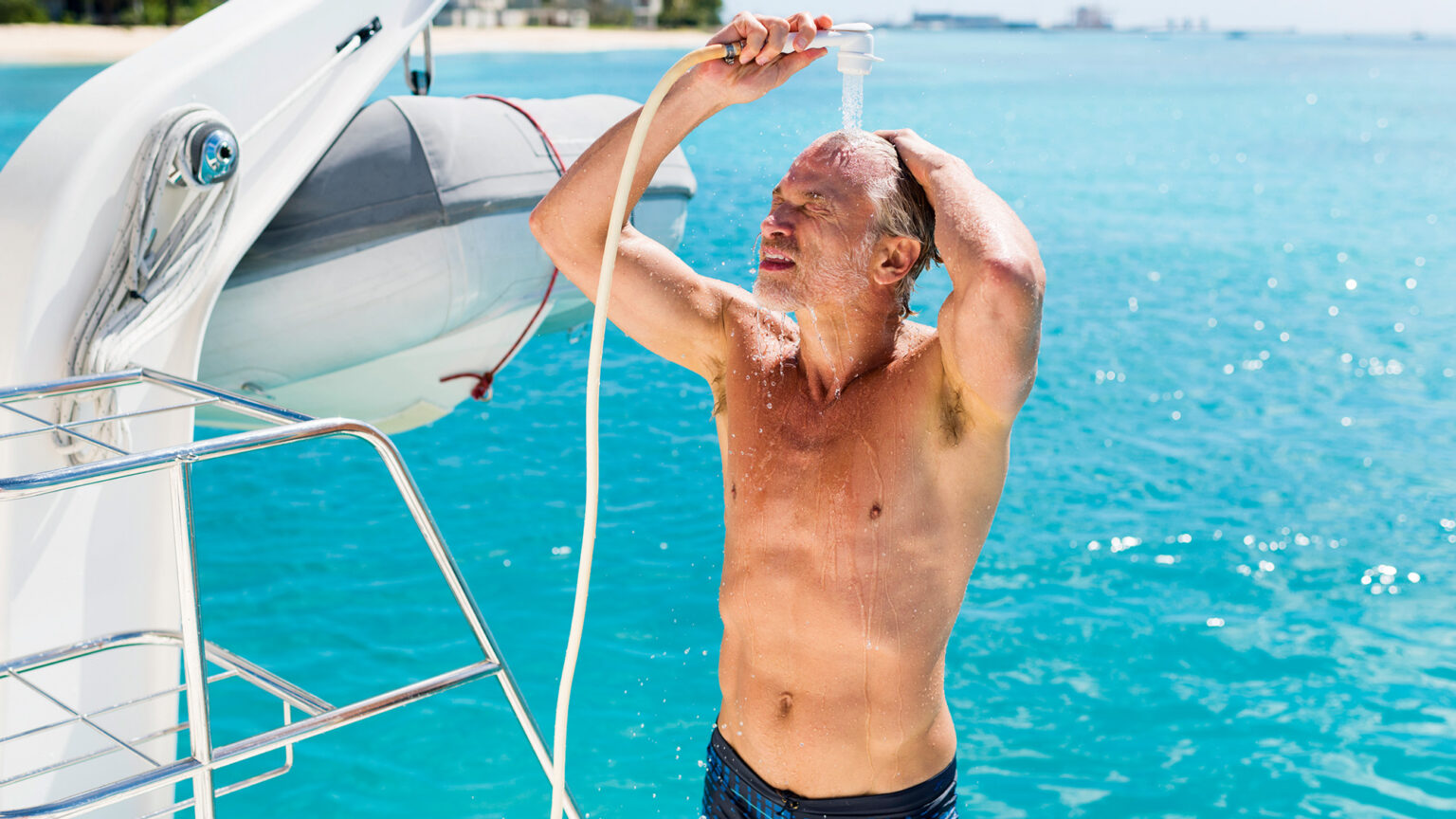Libby Purves reflects on the importance of water and how accustomed we’ve all become to having it readily available.
Water management is often overlooked in our cruising adventures. While blue-water sailors certainly ponder it frequently, we’ve previously installed – and then put away – two watermakers, both of which consume a lot of power (and fuel) and time. They trickle out desalinated water as someone onboard points out the essential minerals we’re missing, shaking a pack of magnesium tablets.
Earlier, during my youthful excitement, I longed for a much-needed shampoo after three weeks of leisurely sailing toward Barbados. We had spent a week with unstably balanced twin headsails while the mainsail was down, when a sudden, intense rainstorm filled the mainsail’s bunt, dripping down temptingly.
Enthusiastically, I reached for the shampoo, positioned myself beneath the downpour, got started, and… to my dismay, the rain stopped, the precious drops faded away, the sun mocked me, and my hair resembled a dried cappuccino.
Our skipper lacked sympathy, and I suspected his wife secretly used dry shampoo in their spacious cabin. Thus, I was denied even a small cup to rinse my hair. After being salty, sweaty, and itchy for far too long, I reluctantly contemplated using the cockpit bucket to dip in some Atlantic water, opting for the salty itchiness instead of soapiness. Finally, he relented.
This was a nostalgic reminder of how meticulously a seagoing craft should handle fresh water—it’s a lesson from the past. Over the years, we have transported it in dinghies using plastic containers filled from slow taps behind Irish pubs, drawn hoses across the fishy decks of unaccommodating Scottish trawlers, and on islands where water scarcity is a daily worry for locals, we’ve anxiously awaited the designated time for access.
I remain uncomfortable seeing people pressure-washing their decks in warm harbors, and the shower attachment in our heads is a rare luxury, deserving of reverence, akin to a meeting with the Pope. However, the skipper assures me that I’m still the fastest washer.
Article continues below…
Giles Coren, the playful Times columnist, recently wrote about items that gradually disappear from regular use, whether due to…
This month, I won’t be in theaters with a notebook as frequently – it’s time for something broader and wetter…
In any case, unless you never stray far from marinas with reliable hose connections, you tend to give significant thought to your water tanks and practice personal hygiene and dishwashing with extreme frugality.
For years, I resisted electric galley taps, believing in the integrity of honest hand-pumping, as Admiral Nelson would have. Admittedly, it may have bordered on obsessive-compulsive behavior. However, I matured, the boats grew larger, and Paul excels in managing our tankage.
This summer, however, his sensible practices backfired. He filled up just days before our first Channel crossing, coinciding with the (privatized and spoiled) Southwest Water admitting a pipe contamination with farm waste, leading to a boil-water notice.
We learned about cryptosporidium causing severe illness, and even our cats and dogs hesitated around their bowls.
Now, we had two full tanks of that water, with new crew members ready to set sail, while we realized cryptosporidium was thriving inside the boat’s plumbing system, which takes ages to empty. Although we heard that the Dartmouth side was not affected by the contamination, that’s not where our berths are located.
Given the need to conserve fuel (as the challenges with gas bottles have persisted since the Covid lockdown), we frantically searched for the right powerful filter for one tap, purification tablets, and solutions for various needs, including a camper’s emergency plastic water container with a tap meant for boiled water for brushing our teeth.
In essence, we returned to earlier days, or perhaps the dubious tropics. It’s likely beneficial for us, both morally and environmentally. Just as Ellen McArthur highlighted how ocean sailors are mindful of every piece of kitchen paper they use, we too will now carefully consider clean water, much like a significant portion of the world’s population does.
703 million people stress about water daily, often carrying it substantial distances. So, I’m donating to WaterAid and feeling a reluctant sense of gratitude toward our dreadful water companies.
Enjoyed this article?
A subscription to Yachting Monthly magazine costs about 40% less than its cover price, allowing you to save money versus single-issue purchases.
Print and digital editions are available through Magazines Direct, where you can also discover the latest offers.
YM is filled with information to maximize your enjoyment on the water.
Enhance your seamanship with tips, advice, and skills from our experts.
Impartial in-depth reviews of the latest yachts and equipment.
Cruising guides to help you reach those dream destinations.
Follow us on Facebook, Twitter, and Instagram.

